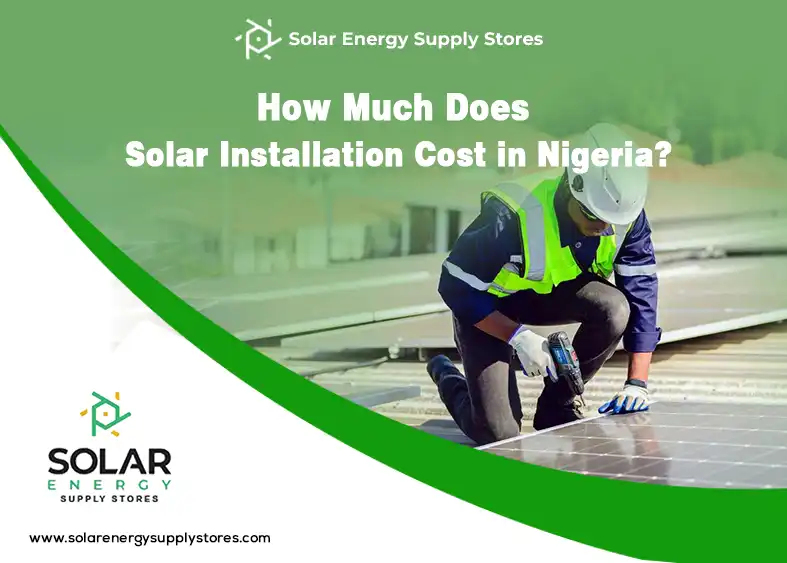24/7 Support
+2349031619810
Visit Our Wharehouse
F-Line 817 Ojo Alaba
End of Content.
+2349031619810
F-Line 817 Ojo Alaba
End of Content.

Solar Installation in Nigeria is rapidly gaining momentum as more individuals and businesses seek reliable alternatives to the national power grid. With abundant sunlight throughout the year, Nigeria is perfectly positioned to benefit from solar energy. From small home systems to large-scale commercial setups, solar installation offers a sustainable and cost-effective solution to the country’s electricity challenges. This growing demand is driving innovation, affordability, and increased access to clean energy across the nation.
In this guide, we’ll walk you through everything you need to know about solar installation in Nigeria—from system types, costs, and components to choosing the right installer and avoiding common mistakes.
Whether you live in Lagos, Abuja, Port Harcourt, or a rural village, this post is tailored for first-time buyers, homeowners, businesses, and solar investors.
Solar installation involves setting up a complete solar energy system to generate, store, and use power. This typically includes:
This system can work independently (off-grid), complement PHCN power (hybrid), or feed back into the grid (on-grid, rare in Nigeria).
| Installation Type | Description | Best For |
|---|---|---|
| Off-grid | Fully independent from PHCN | Rural homes, farms |
| Hybrid | Combines PHCN + Solar + Generator | Urban homes, businesses |
| On-grid (rare) | Solar feeds electricity back to grid | Industrial setups |
| Mini-grid | Community solar powered setup | Villages, estate clusters |
| System Size | Estimated Cost (₦) | Suitable For |
|---|---|---|
| 1kVA | ₦300,000 – ₦450,000 | Fan, bulbs, phone charging |
| 2kVA | ₦500,000 – ₦700,000 | TV, fan, fridge, bulbs |
| 5kVA | ₦1.2m – ₦1.8m | AC, freezer, pumping machine |
| 10kVA | ₦2.5m – ₦4m | Full duplex, offices |
| 20kVA+ | ₦5m+ | Hospitals, hotels, factories |
| Company | Location | Specialty |
|---|---|---|
| Havenhill Synergy | Abuja | Off-grid & Mini-grids |
| Rubitec Solar | Lagos | Hybrid Systems |
| Auxano Solar | Nationwide | Solar Panels, Installation |
| Cloud Energy | Lagos | Home & Office Kits |
| BlueCamel Energy | Abuja | Smart solar systems |
| GreenPower Overseas | Lagos | Industrial & Commercial solar |
You can also find installers on SolarEnergySupplyStores.com, Nigeria’s leading free classified platform for solar products and services.
✅ 24/7 electricity
✅ No fuel, no noise, no fumes
✅ Lower energy bills (save up to 80%)
✅ Low maintenance
✅ 25+ years lifespan
✅ Eco-friendly and silent
❌ Skipping energy audit – You’ll undersize or oversize your system
❌ Using fake products – Leads to poor performance and breakdowns
❌ Ignoring roof direction & shading – Affects solar panel efficiency
❌ Hiring unqualified installers – Risk of fire, poor wiring, system failure
❌ Buying incompatible components – Panels, batteries, and inverters must match specs
A basic 1kVA system starts around ₦300,000. A full home system (5–10kVA) costs ₦1.2m to ₦4m depending on quality and components.
For small systems: 1–2 days. For large installations: 3–7 days, depending on site and configuration.
It depends on your power consumption. A 2kVA is enough for fan, bulbs, fridge, and TV. A 5kVA can power ACs, deep freezers, water pumps.
Absolutely. After the initial cost, you enjoy 24/7 power with no fuel costs, no noise, and minimal maintenance.
No, you can go completely off-grid. But hybrid systems give the flexibility of switching to NEPA or generator when needed.
Keep panels clean, check connections quarterly, and replace batteries when their capacity drops. Use a surge protector and solar monitoring system.
Solar installation in Nigeria is not just a trend—it’s a long-term solution to the nation’s electricity crisis. With rising fuel prices, unreliable grid power, and growing energy demand, going solar is smart, sustainable, and cost-effective.
Whether you’re a homeowner, business owner, or estate manager, investing in a solar system provides energy independence, peace of mind, and real cost savings over time.
Welcome to Solar Energy Supply Stores – your trusted one-stop online shop for all things solar in Lagos, Nigeria. We are committed to powering homes, businesses, and communities across the nation with reliable, eco-friendly energy solutions.
Solar Energy Supply Stores © 2025. All Rights Reserved.